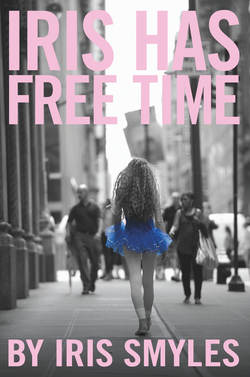Читать книгу Iris Has Free Time - Iris Smyles - Страница 22
На сайте Литреса книга снята с продажи.
IV
ОглавлениеMy current apartment on West Tenth Street has a small walk-in closet. For the last year, I’ve been storing the T-shirts on a high shelf in the back. When I run out of clean underwear, I’ll pull out a pair of Bad Ass panties.
After pulling on one of fifty left-over Second Base T-shirts, I gather up my dirty clothes and head to the Laundromat. Around my neck, the cotton hangs heavy. I mean, they’re great shirts, don’t get me wrong, but they’re conversation starters, like the guy at the print shop said, and I don’t want to talk about it. But there lies my punishment.
Forthwith this frame of mine was wrenched With a woeful agony, Which forced me to begin my tale; And then it left me free.
Since then, at an uncertain hour, That agony returns; And till my ghastly tale is told, This heart within me burns.
I pass, like night, from land to land; I have strange power of speech; That moment that his face I see, I know the man that must hear me: To him my tale I teach.
What is there to say? I shot the albatross and now I must wear it.
On my way out, I pick up a book of Coleridge poems. It’s for a course I’m taking on Romanticism in the graduate Humanities department at NYU, the only program that accepted me. With an undergraduate major in “Individualized Study,” my transcript—Fate and Free Will, Tai Chi, Voyages of Identity, Sense Memory, Poetry Writing, Tap—reads like the afternoon agenda at a posh mental health facility. Lacking the true English credits PhD programs require just to apply, I’ve had to enroll in this Humanities division. If college leaves most graduates unprepared for the real world, my degree, more ambitiously, has left me unprepared for academia to boot.
Anyway, I like being a student again, whiling away the hours in libraries and cafés, reading books I was supposed to have read back in college (Madame Bovary: I confess I only read the CliffsNotes.). “Youth is wasted on the young,” Shaw wrote. This is equally true of college. Certainly it’s the raison d’être of graduate students. But what does it matter what I study finally, when time is really what I’ve bought? Like I told the guy at the job fair, I’m working on a novel, that’s my main thing.
In addition to Romanticism, I’m taking a class called History of the Novel, which, it turns out, has been a controversial art since its inception. We’ve been reading all about Anthony Comstock’s banned books and yesterday had a long discussion about the growing fear in the eighteenth and nineteenth centuries that novels were perverting the minds of the young, particularly the minds of very young girls. The professor distributed this text from an 1815 almanac:
The indiscriminate reading of Novels and Romances is to young females of the most dangerous tendency . . . it agitates their fancy to delirium of pleasure never to be realized . . . and opens to their view the Elysium fields which exist only in the imagination . . . fields which will involve them in wretchedness and inconsolable sorrow. Such reading converts them into a bundle of acutely feeling nerves and makes them “ready to expire of a rose in aromatic pain” . . . The most profligate villain, bent on the infernal purpose of seducing a woman, could not wish a symptom more favorable to his purpose than a strong imagination inflamed with the rhapsodies of artful and corrupting novels.
—T. E. C., JR., MD
After he finished reading it aloud, everyone was excited and a wonderfully interesting conversation ensued. Instead of leaping into the fray as I usually do, however, for a while I just listened. Looking around that safe, warm, wood-lined classroom, out the window of an old brownstone situated comfortably at the edge of Washington Square, and then back across the conference table, at the animated faces of my impassioned peers—eager full-time Humanities students like me, young, unemployed, would-be writers and poets, possessed by literature to the point of total incompetence—it hit me: The real danger of the novel is that it might make you want to write one yourself.
